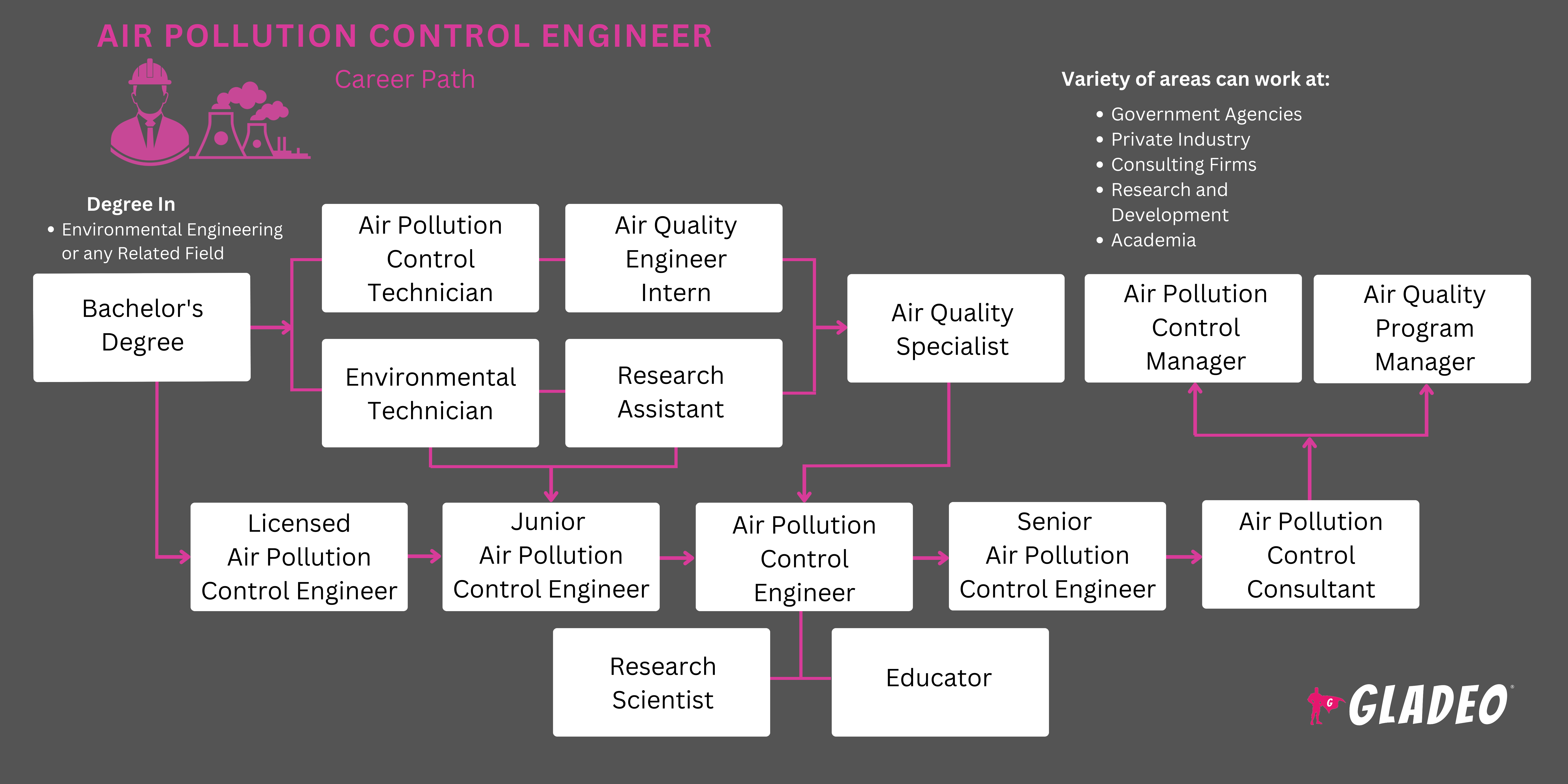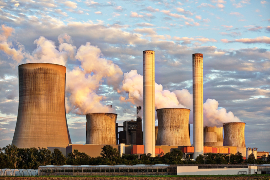Focos de atención
Ingeniero medioambiental, Ingeniero de calidad del aire, Especialista en calidad del aire, Ingeniero de cumplimiento medioambiental, Ingeniero de control de emisiones, Ingeniero de salud y seguridad medioambiental, Especialista en aire limpio, Analista de calidad del aire, Consultor medioambiental (especializado en calidad del aire), Especialista en control de la contaminación atmosférica.
Air pollution is not only a huge and expensive problem, but it’s also everyone’s problem. Over 1/3rd of Americans “live in places with unhealthy levels of air pollution,” according to the American Lung Association. And if we don’t address it, that’ll extend to the rest of us eventually.
Poor air quality can lead to or contribute to a range of medical conditions like asthma, cardiovascular disease, metabolic problems, and issues with our nervous and reproductive systems.
Industries known for impacting air quality include energy production, transportation, manufacturing, agriculture, and more. Organizations in such industries use Air Pollution Control Engineers to design and implement systems that reduce harmful emissions, helping to ensure that industries can comply with air quality standards.
As a specialized type of environmental engineer, Air Pollution Control Engineers also identify sources of pollution, optimize control systems, and check that emissions aren’t exceeding legal limits. Their work safeguards public health and the environment while enabling industries to continue operations in a safer, more eco-friendly manner!
- Play a vital role in protecting public health and the environment
- Ensure adherence to air quality regulations and standards
- Contribute to sustainable industrial practices and environmental conservation
Horario de trabajo
Air Pollution Control Engineers work full-time with overtime required for urgent projects or compliance deadlines. Travel may be necessary for onsite evaluations and system implementations.
Tareas típicas
- Conduct site inspections and audits; check emission sources and control systems
- Collect samples of soil, water, and gas, following Environmental Protection Agency guidelines
- Analyze and interpret environmental data using modeling, simulation tools, and Geographic Information Systems. Look for contaminants and pollutants
- Identify potential safety hazards and environmental risks. Ensure safe levels of air quality
- Collaborate with other engineers, scientists, and regulatory bodies
- Design and oversee the installation of air pollution control systems
- Develop strategies for reducing air pollutants such as greenhouse gases
- Ensure compliance with local, state, and federal air quality regulations
- Prepare documentation and reports for regulatory compliance
- Develop training programs on air quality management and pollution control
- Train and supervise newer technicians
Responsabilidades adicionales
- Provide technical expertise on air quality impact assessments
- Calibrate test instrument
- Support investigations of incidents and accidents; determine root causes and recommend preventive measures
- Research trends, best practices, regulatory changes, and new technologies
Habilidades blandas
- Analítica
- Atención al detalle
- Pensamiento crítico
- Razonamiento deductivo e inductivo
- Orientado al detalle
- Independiente
- Integridad
- Monitorización
- Objetividad
- Organización
- Perceptivo
- Resolución de problemas
- Comprensión de lectura
- Orientado a la seguridad
- Gran capacidad de comunicación
Habilidades técnicas
- Air quality management and pollution control technologies
- Respuesta de emergencia
- Engineering principles and practices
- Environmental monitoring, sampling, data collection, and analysis tools and techniques
- Environmental regulations and compliance measures
- Environmental reporting tools
- Sistemas de Información Geográfica (SIG)
- Mobile and stationary sensors
- Gestión de proyectos
- Report writing and presentation
- Safety and health assessment techniques
- Tools for data analysis, statistical modeling, and environmental modeling
- Agricultural organizations
- Empresas energéticas
- Empresas de consultoría medioambiental
- Government regulatory agencies (federal, state, and local)
- Manufacturing plants
- Public Utilities
- Instituciones de investigación
- Transportation authorities
Air Pollution Control Engineers may work in industrial settings, exposed to pollutants and hazardous conditions. They must closely follow protocols to avoid mishaps and ensure their health and safety.
Persistence, patience, and strong communication skills are needed to tackle industry challenges related to air quality issues. The health and welfare of workers, communities, and the environment are at stake, so they have to be diligent and effective to make a real impact.
Because technology and policies continue to evolve, they must strive to keep up with the changes through continuous learning.
In recent years, there’s been a lot of public and governmental pressure to protect the environment more—including our air quality! One initiative is the creation of the Environmental Protection Agency’s National Air Toxic Trends Sites network to assess trends and emission reduction program effectiveness.
A major goal is reducing criteria pollutants (carbon monoxide, lead, nitrogen dioxide, ozone, particulate matter, and sulfur dioxide) that pose serious health and environmental risks. Air Pollution Control Engineers are at the forefront of that push to reduce these harmful elements from our air by implementing regulations and using advanced tools like remote sensing for more precise monitoring.
AI has also been incorporated into the field, requiring engineers to update their tech skills so they can maximize the power of these new tools!
¿Qué tipo de cosas disfrutaba la gente de esta carrera cuando era más joven...
Students who become Air Pollution Control Engineers often have an interest in the natural world and environmental conservation. They might have loved science clubs, running around outdoors, and being involved with community-based sustainability projects. Many were interested in biology, chemistry, and environmental studies from an early age.
Students who become Air Pollution Control Engineers often have an interest in the natural world and environmental conservation. They might have loved science clubs, running around outdoors, and being involved with community-based sustainability projects. Many were interested in biology, chemistry, and environmental studies from an early age.
- Air Pollution Control Engineers usually need a bachelor’s degree in environmental or chemical engineering. Some positions require a master’s degree
- Relevant coursework may include:
- Air Pollution Control
- Gestión de la calidad del aire
- Climate Change and Adaptation Measures
- Ecological Engineering
- Emission Control Technologies
- Environmental Chemistry
- Evaluación del impacto ambiental
- Environmental Microbiology
- Gestión de residuos peligrosos
- Termodinámica
- Water and Wastewater Treatment
- Hands-on experience through internships or cooperative engineering programs is highly beneficial
- Engineers may go on to take the Fundamentals of Engineering exam, earn a National Council of Examiners for Engineering and Surveying’s Engineer In Training certification, and pursue a National Society of Professional Engineers’ Professional Engineer license
- Workers may need a valid driver’s license to travel to job sites
- Look for ABET-accredited schools offering programs in environmental or chemical engineering
- Piensa en tu horario y en tu flexibilidad a la hora de decidir si te inscribes en un programa presencial, online o híbrido
- Seek programs with internship or cooperative education opportunities
- Considere el coste de la matrícula, los descuentos y las oportunidades de becas locales (además de la ayuda federal)
- Look for programs that collaborate with external partners, which can augment your learning experience
- Review graduation rates and post-graduate job placement statistics
- Participate in science and engineering clubs to gain practical skills
- Look for environmental projects to learn about air quality issues
- Focus on courses in mathematics, chemistry, physics, and environmental science
- Considering doing a pre-apprenticeship program in high school to gain practical hands-on experience where you can apply principles in the real world
- Seek mentorship or shadowing opportunities with air pollution professionals
- Ask a seasoned Air Pollution Control Engineer to do an informational interview with you, or see if you can shadow them at work for a day
- Get a part-time job related to air quality (such as an Air Quality Technician)
- Watch videos and read blogs like Airly and AirNow to stay informed about industry trends. Additional blogs include:
- Check out job descriptions posted on employment portals to determine the most current job qualifications and areas of specialization that might interest you
- Engage in air quality-related discussion groups like r/AirQuality on Reddit or other forums
- Join professional organizations like the National Association of Clean Air Agencies
- Apply for engineering scholarships or apprenticeships
- Keep track of work and academic accomplishments for your resume and college applications

- Upload your resume on job portals like Indeed, SimplyHired, Monster, USAJobs, ZipRecruiter, and Glassdoor
- Sign up for alerts so you won’t miss it when a new job is posted
- Revise los anuncios de empleo y busque palabras clave para incluirlas en su currículum, como:
- Air Pollution Control Engineering
- Air Quality Analysis
- Air Sampling Techniques
- Atmospheric Science
- Carbon Footprint Analysis
- Emission Control Technologies
- Emission Inventory
- Environmental Auditing
- Evaluación del impacto ambiental
- Environmental Risk Assessment
- Greenhouse Gas Emissions
- Gestión de residuos peligrosos
- Higiene industrial
- Pollution Monitoring
- Review Air Pollution Control Engineer resume templates and sample interview questions
- Ask your school to connect you with recruiters. Take advantage of chances to intern with environmental safety-related organizations
- Acude al centro de orientación profesional de tu centro de estudios para que te ayuden con el currículum, hagan simulacros de entrevistas y te informen sobre las próximas ferias de empleo.
- Do your research on potential large employers, such as:
- Durante las entrevistas, demuestre un gran conocimiento de las tendencias del sector
- Vestir de forma profesional para las entrevistas de trabajo
- Ask previous professors and supervisors to write a recommendation
letters or request their consent (in advance) to list them as references
Páginas web
- Consejo de Acreditación de Ingeniería y Tecnología
- Air & Waste Management Association
- Air Knowledge
- Airly
- AirNow
- Air Pollution News
- Air Quality News
- AirQualityNews.com
- Academia Americana de Ingenieros y Científicos Medioambientales
- Sociedad Americana de Enseñanza de la Ingeniería
- Association of Air Pollution Control Agencies
- Centros para el Control y la Prevención de Enfermedades
- Consejo de Coordinación del Personal de Laboratorio Clínico
- Consejo de Ingeniería Industrial
- Daily Dose Of Air Pollution
- Departamento de Energía
- Agencia de Protección del Medio Ambiente
- Environmental Science.org
- Hazardous Waste Operations and Emergency Response Standard
- Indoor Air Quality
- Institución de Ingeniería y Tecnología
- International Society of Exposure Science
- Asociación Nacional de Gestión Medioambiental
- National Association of Clean Air Agencies
- Asociación Nacional de Profesionales del Medio Ambiente
- Junta Nacional de Examinadores de Salud Pública
- Consejo Nacional de Examinadores de Ingeniería y Topografía
- Asociación Nacional de Salud Ambiental
- National Environmental Health Science and Protection Accreditation Council
- Instituto Nacional de Certificación en Tecnologías de la Ingeniería
- National Institute for Occupational Safety and Health
- Institutos Nacionales de Salud
- National Radon Safety Board
- Registro Nacional de Profesionales del Medio Ambiente
- Consejo Nacional de Seguridad
- Sociedad Nacional de Ingenieros Profesionales
- Administración de Seguridad y Salud en el Trabajo
- Sociedad de Toxicología y Química Medioambientales
- Departamento de Agricultura de Estados Unidos
Libros
- Air Quality, by Wayne T. Davis, et al.
- Choked: Life and Breath in the Age of Air Pollution, by Beth Gardiner
- Climate Restoration: The Only Future That Will Sustain the Human Race, by Peter Fiekowsky and Carole Douglis
Air Pollution Control Engineers play a crucial role in guiding sustainable practices and policies to protect our natural world for future generations. But if this career field isn’t grabbing your interest, consider a few related fields that may also aid the environment, such as:
- Brownfield Redevelopment Specialist
- Ingeniero Químico
- Ingeniero de Caminos, Canales y Puertos
- Analista de cambio climático
- Científico de la conservación
- Emission Trading Specialist
- Inspector de cumplimiento de la normativa medioambiental
- Environmental Consultant
- Environmental Engineering Technologist
- Environmental Policy Advisor
- Científico medioambiental
- Hidrólogo
- Ecólogo industrial
- Higienista industrial
- Ingeniero Mecánico
- Director de Ciencias Naturales
- Especialista en gestión de proyectos
- Ingeniero de aguas/aguas residuales
- Especialista en recursos hídricos
Newsfeed

Trabajos destacados

Cursos y herramientas en línea








